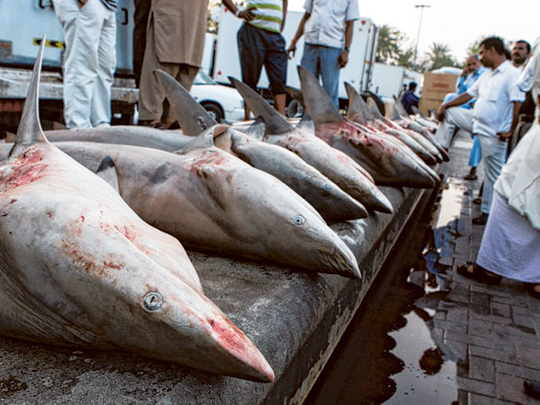
Dubai: According to 2010 figures recorded by the Hong Kong Census Bureau, the United Arab Emirates is exporting 498 metric tonnes of shark fins annually.
Shipments of dried and frozen fins for consumption in high-end soup to Hong Kong markets make the UAE the fifth largest exporter to the Far East, marine scientists were told at an inaugural Shark Conservation Forum on Monday in Dubai.
But while the sheer enormity of fins hacked from sharks is leading to concerns that shark populations around the world — and ultimately in the Gulf — are collapsing, one expert said that observers must be careful when citing numbers given large gaps in shark conservation data globally.
Speaking on Monday at the opening of the four-day Shark Conservation in Arabia Workshop, Dr Nicholas K. Dulvy, co-chair of the International Union for Conservation of Nature’s (ICUN) Shark Specialist Group, said he doesn’t believe the UAE is consuming as many Gulf sharks as the figures would suggest.
The workshop was jointly hosted by the International Fund for Animal Welfare (IFAW) and United Arab Emirates Ministry of Environment and Water.
Dulvy, a biological sciences professor at Simon Fraser University in Canada, said by and large, the numbers probably represent fins imported into the UAE and then re-exported to the Far East, he said.
“These numbers do not mean that the UAE is the fifth largest shark-killing nation in the world. It just means that there is a big flow [of exported fins] through the country,” Dulvy told Gulf News following a keynote address. “Dubai is a natural conduit of fin trading, it isn’t that the UAE is the bad boy on the block.”
Best estimates compiled by ICUN peg annual shark and ray harvest in UAE Gulf waters at around 2,000 metric tonnes per annum, he said, but that number is difficult to precisely pin down given that new studies of 30 species of Gulf shark stocks have only recently begun and will take years to provide conclusive population numbers.
However, based on the annual catch figure, Dulvy said math dictates that only three per cent of that total yearly domestic shark catch yields only 60 metric tonnes of shark fins that are shipped to Hong Kong. The remainder of exports is fins shipped into the UAE from other countries.
The low domestic catch is more plausible when accounting for what Dulvy called “progressive management policies” in the UAE which dictate that sharks must be caught wholly and then landed in the marketplace intact in order to collect fins for sale to markets such as Hong Kong.
The UAE’s strict policy combined with a harvesting season only for eight months of the year — allowing four months for reproduction from January to April — is better than most neighbouring countries, Dulvy said, and gives the local shark populations along the UAE coast a fighting chance.
A fighting chance is something slow-reproducing sharks around the globe are not being given as overfishing for fins decimates shark populations, according to research by ICUN which has assessed 1,041 species globally.
Dulvy said only 25 per cent of the species are considered safe with the remainder falling into different categories ranging from endangered to critically endangered.
Global data compiled by marine scientists suggests that 38 million sharks are harvested globally while higher predictions say anywhere from 70 to 100 million sharks are caught every year.
“Shallow water species are the most likely to be threatened,” said Dulvy, noting that easier access in more shallow waters is leading to faster depletion of some stocks. “Four out of five threatened species are found in water 200 metres of less. Coastal species are more likely to be threatened than deep-water species.”
Dr Ralf Sonntag, IFAW Country Director for Germany, said in a keynote address that “73 species of sharks are considered threatened” around the globe and said there is an “ever-increasing reality of the disappearance of sharks”.
In some places, sharks are down to 20 per cent of their original populations and given their low reproduction rates are at a tipping point.
“Sharks have exceptionally limited biological productivity, therefore they can be overfished.”
He lauded the UAE government for its tough no-finning laws that prohibit fins of sharks to be hewn from live sharks which are then sent to the bottom to certain death.
He said he hoped further measures such as the UAE’s laws would be introduced at the upcoming March 2013 meeting of Convention on International Trade in Endangered Species of Wild Fauna and Flora (CITES) in Bangkok.
Saif Mohammad Al Shara, acting assistant undersecretary Agricultural Affairs and Animal Sector of the Ministry of Environment and Water, said the ministry regulated shark fishing in 2008 with “Ministerial Resolution 542”.
He said, “sharks face intensive pressure under the fishing operations that induce depletion of their groups not only in the Arabian region but also all over the world. The threats that these species are facing require all of us to think of this problem and its reasons and to lay down solutions as well.”












